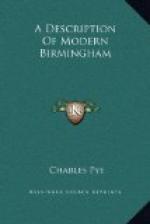The whole is inclosed by iron palisadoes, in the form of boarding pikes, connected by a twisted cable. At each of the four corners is fixed a cannon, erect, from which issues a lamp post, representing a cluster of pikes, supporting a ship lantern.
The late Mr. Joseph Farror, of this town, at his decease, bequeathed six-pence per week, to be paid for ever, out of rents arising from a house in Bradford-street, for keeping the basement and statue of Lord Nelson clean and free from dirt, which is received by the wardens of St. Martin’s church.
Proof House.
Although government have at all times a large store of fire arms in the tower of London, yet, after the revolution had taken place in France, and England was threatened with an invasion, the numerous volunteers who offered their services at that time, to repel the enemy, required such a profusion to be distributed among them, that it became necessary to purchase large quantities from any part of the continent where they could be procured; and the volunteers of this town were supplied with muskets from Prussia. The words ‘liberty’ and ‘equality’, used by the French military, produced such an effect on the continent, that England was necessitated to manufacture arms for its own defence. Thus situated, application was made to the gun-makers in this town, but the number of hands at that time employed in the trade was so limited, that they could only supply small quantities; but when war was renewed, after the peace of Amiens, great encouragement being given by government, the manufacturers of arms in this town were, in the year 1804, enabled to supply five thousand stand of arms monthly.
At that time, so many workmen had obtained a knowledge of the trade, that in the year 1809 the government were supplied with twenty thousand stand of arms monthly, and in 1810, the number was increased from twenty-eight to thirty thousand monthly; and that number was regularly supplied until the peace of Paris.
In order to expedite the business, a proof house was established by government, in Lancaster-street, under an inspector from the board of ordnance.
An act of parliament was obtained in the year 1813, for the erection of a proof house in this town, where all barrels of guns, pistols, blunderbusses, etc. must be proved and marked, under a severe penalty; and since that time, the manufacturing of fowling pieces has increased to a considerable degree.
It is situated on the banks of the canal, in Banbury-street, and is conducted under the direction of three wardens, who are annually made choice of from the body of guardians and trustees, they being nominated in the act of parliament.[4] In addition to them, the Lords Lieutenants for the counties of Warwick, Worcester, and Stafford, the members serving in parliament for the said counties, for the time being, respectively, and the magistrates acting within seven miles of the town of Birmingham, are appointed as guardians.




